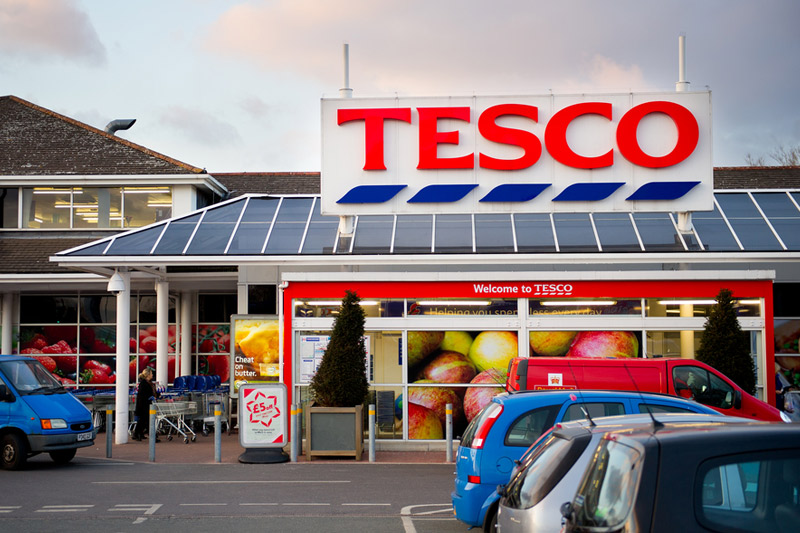
Tesco (OTC:TSCDY) shares fell over 5% on Thursday after the UK’s largest supermarket chain delivered a solid set of FY25 results but offered a cautious profit outlook for FY26, citing rising competitive intensity, cost pressures, and the need to maintain price leadership.
The group’s adjusted operating profit of £3.13 billion came in slightly ahead of consensus (£3.07bn), with retail EBIT of £2.97 billion also beating internal guidance (£2.9bn) and in line with expectations.
Total group sales excluding VAT and fuel rose 4% to £63.6 billion, while revenue including fuel reached £69.9 billion, up 3% YoY. Like-for-like (LFL) sales in the UK rose 4% for the year and accelerated to 4.3% in Q4, implying a strong end to FY25.
Republic of Ireland LFLs grew 4.6%, Booker declined by 1.8% amid softness in the foodservice sector, and Central Europe grew 2.2%, helped by strong fresh food volume and product innovation.
Retail adjusted operating profit rose 10% YoY to £2.97bn, with Central Europe outperforming expectations on margins (+107bps YoY), while UK margins improved slightly (+5bps YoY).
Adjusted diluted EPS rose 17% to 27.38p, above consensus of 26.7p. Statutory diluted EPS fell 5.7% to 23.13p, impacted by a £286m non-cash impairment related to higher bond yields.
Free cash flow landed at £1.75 billion, near the top end of Tesco’s £1.4–1.8bn guidance range, despite a small working capital outflow.
Net debt fell by £230 million to £9.45 billion, driven by strong cash generation and the £614 million proceeds from the sale of Tesco’s banking business to Barclays (LON:BARC). Leverage improved from 2.2x to 2x net debt/EBITDA.
Tesco continues to deliver on shareholder returns, proposing a final dividend of 9.45p per share, bringing the full-year total to 13.70p — up 13.2% YoY and slightly above consensus (13.4p).
Total cash returns amounted to £1.88bn, including £1.02bn in buybacks. The retailer announced a new £1.45bn share buyback program to be completed by April 2026, funded by both FCF (£750mn) and banking sale proceeds (£700mn).
For FY26, Tesco guided to group adjusted operating profit of £2.7–£3 billion — implying a ~9% drop at the midpoint versus FY25 and around 10% below stale sell-side consensus (£3.14bn).
However, buyside expectations had already adjusted lower after recent peer pricing actions and Tesco’s share price drop of ~13% since mid-March.
Notably, Tesco provided specific numerical guidance despite competitive headwinds — rather than opting for vague language.
The group attributed the cautious range to a “further increase in the competitive intensity of the UK market” and emphasized its commitment to value and flexibility to defend share.
Stripping out the £100mn expected from Tesco Bank, the retail EBIT guidance of £2.6–2.9bn sits broadly in line with Barclays’ and Morgan Stanley’s previews, which anticipated investment to support Tesco’s price position.
Analysts noted that maintaining profitability in the face of £235mn in incremental National Insurance and wage inflation was a creditable result.
Tesco is also extending its “Save to Invest” program, targeting £500 million in cost savings in FY26 — consistent with prior expectations. The company reaffirmed its FCF guidance of £1.4–1.8 billion for the year ahead.
Tesco gained 67bps of UK market share over the year to reach 28.3% — its highest level since 2016. Premium product growth was strong, with the “Finest” range up 15% YoY to £2.5 billion.
Online sales surged 10.2% to £6.8 billion, helped by a rise in weekly orders and expansion of the “Whoosh” rapid delivery service, now in over 1,500 stores. Clubcard penetration reached 84% in the UK, while app users rose 12% to 18 million.
Tesco opened 90 new stores and refurbished 463 across its markets. Capital expenditure rose to £1.46bn (from £1.31bn) as Tesco invested in automation, digital, and store upgrades.
Analysts at RBC called the FY26 guide “on the cautious side” but noted Tesco’s strong fundamentals, margin-accretive growth areas like Retail Media and Clubcard, and continued cash generation.
While Tesco’s share price fell ~5% on results day, some view the sell-off as overdone, given the company’s deliberate investment stance and 11% FY26e cash yield.
Barclays and Morgan Stanley (NYSE:MS) reiterated “overweight” ratings, with price targets at 400p, respectively.
Tesco trades at 13.1x FY26e P/E — slightly below historical average — but offers a compelling yield and defensive positioning in a volatile retail environment.